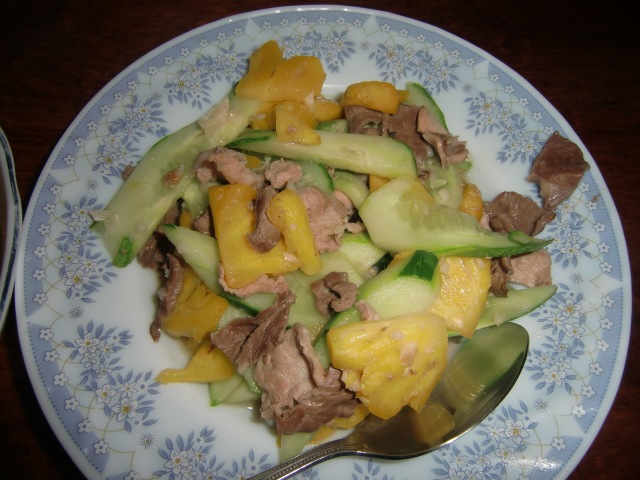 This was dinner last night in my host home.
This was dinner last night in my host home.
It’s one of my favorites: Fried pork bits with pineapple and cucumbers. The combo is mouth-watering. And, of course, all of this is on top of a big bowl of rice.
 Obviously, eating is a very important activity for anyone, but in Cambodia the topic of eating is front and center in nearly every conversation. Whenever I talk to a stranger, meet a friend, see a co-teacher, or talk with a student, one of the first three questions is always, “Nyam bai howie, nou?” Have you eaten rice yet?
Obviously, eating is a very important activity for anyone, but in Cambodia the topic of eating is front and center in nearly every conversation. Whenever I talk to a stranger, meet a friend, see a co-teacher, or talk with a student, one of the first three questions is always, “Nyam bai howie, nou?” Have you eaten rice yet?
Rice is so important to life here that in the Khmer language the verb “to eat” is literally translated to “to eat rice”. So, even if I’m eating a meal with no rice (which is very rare), the saying is still, “eating rice”.
There are many different words that mean “eating rice”.
Here are some of the words that mean “to eat rice” (bai–which sounds like the English word “bye”—means “rice”):
–Nyam bai (average word for eating, most-used, I almost always use this one)
–Hope bai (used more in rural areas, also more polite, my host mother uses this one a lot)
–See bai (vulgar, used to talk about animals eating, sometimes mothers use this to talk about their children eating)
–dtor-dtoo-ul dtee-un (very formal)
–bpi-saa (polite)
If you’re talking to a monk or the King, you don’t use any of these words. They have their own set of words.
Only recently did a friend help me understand why eating is so prominent in greetings and conversations here. She works for an organization in Siem Reap that installs water filters in very poor Siem Reap villages.
She told me that one time they had a group of western volunteers here helping install filters. Because the group was short on time, they asked the Khmer staff to work through their lunch hour. My friend says the Khmer staff clearly did not like or understand this.
My friend tells me asking Khmer people to skip a meal (especially those older than 30 years old) is a sure way to make them have flashbacks to the time of the Khmer Rouge when they witnessed loved ones die of starvation and were starved themselves, surviving by eating very little. Bottom line, you don’t ask people here to skip (or rush through) meals.
So, I think the everyday, friendly question, “Have you eaten rice yet?” has at least some roots in the specific pain that the people here suffered in the 1970s, 1980s and even 1990s.


This looks like something I might actually be able to eat! Very interesting all the different ways to say “eat”! Sad that it takes them back to the times of starvation!
They sure would not like having a teaching job at IKE because we only have TWENTY minutes for lunch every single day! Love ya!
I think I might actually be able to eat that dish, Travis! It looks pretty good. That is interesting history about their eating habits, and well understood.
Love you!
It’s all very easy to eat. You’d be surprised to know you can probably eat it all and find it tasty, and almost every (if not all) food here has far fewer chemicals (if any at all) than foods in the US. And, most times it’s much more fresh. So, it’s quite easy and enjoyable to eat when I think about all the crazy stuff we ingest in the US.
That is just one more reminder of all that they have gone through, and it’s almost as if you are asking for affirmation that a person is “OK” when you greet them ~ out of human concern. We are so lucky to have lived the life each of us has been blessed with, in so many ways, and sad that we take so much for granted!
I have to agree with everyone else that this looks like something much more appealing. I’m also going to have to disagree with you because there’s no way I’d be eating pig’s blood let alone finding it tasty. Miss you tons cousin!
Miss you too Katie!
I think your picky Aunt Kaki might even be able to eat that meal! I know it is good to eat on a regular schedule and not skip meals. They are very wise! I hate that this was likely based when they were forced to miss meals and had very little to eat. Thanks for sharing all the different ways to say “eat rice”. Love, Kaki